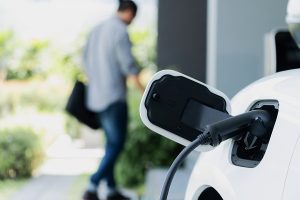Is Your Home’s Electrical System Ready for EV Charging?
You’ve made the leap to an electric vehicle and feel great about the environmental benefits and the money you’ll save on fuel. However, electric cars come with the need for charging. While chargers in the community are becoming more numerous, there is a definite benefit to charging your car at home. Not only is a home charger cheaper than public charging, but when you can plug in at home, you’ll never worry about getting and finding a spot, and you’ll always be able to begin your day with a full charge. But deciding to install an EV charger is only the first step. Can your home handle an EV charger?
Are There Risks to Installing an EV Charger?
If you choose to install a charger, you do need to consider the risks. In most cases, the most significant risk of installing an EV charger is overloading your electrical system. This can be a bigger problem than an ineffective charge from a weak system. When your electrical system is overloaded, you risk an electrical fire that can devastate your home and family. If you attempt to install the charger on your own or by using a handyman, there are also major safety risks. If the system isn’t correctly installed, you can put yourself at risk of electrocution. If you are installing an EV charger, having a licensed electrician with experience in this installation is the best way to mitigate the risks.
Understanding the Demands of the EV Chargers
Not every EV charger is the same, requiring different power levels. EV chargers are categorized into three levels, depending on how much electricity they need and how quickly they can charge a vehicle. The Level 3 chargers found in public charging stations can charge a car in under an hour but require significant power and are usually unsuitable for home use. In contrast, a Level 1 charger can be installed quickly and easily in most homes, but it will take several hours for a full charge.
Most homeowners opt for a Level 2 charger, which requires a 240-volt outlet (not a standard 120-volt found in most homes) and usually requires an electrician to upgrade the electrical panel and handle the installation.
Check the Electrical Panel Capacity
The most competent homeowners have their home EV chargers installed by a licensed electrician. The benefit of using an electrician is that they can inspect your current system and determine if your current panel can handle the increased load. Before an electrician installs your panel, they will do an assessment. You will likely need to upgrade your panel if you live in an older home. Depending on how old your system is, this can be a quick upgrade of a few hundred dollars or a complete overhaul of an outdated system that can cost thousands. Most older homes have electrical panels that can handle 100-150 amps, but the most popular Level 2 EV chargers need at least 200 amps of capacity to operate without overloading the system.
Before getting an electrician out to assess, you can look for signs that your panel may need an upgrade. Flickering or dimming lights, breakers that trip frequently, limited breaker space on the panel, or a panel that feels warm to the touch are all signs that you need an upgrade.
Inspect the Circuit Availability – Do You Need a Dedicated Circuit?
Your home likely has several different circuits that operate power in various areas of your home. Appliances that require more power, like your HVAC system, are usually put on a different circuit. That way, only that area will be impacted if one circuit is overloaded. An electrician will most likely recommend a dedicated electrical circuit for your EV charger. This means that your EV charger will operate independently from the rest of your home’s electrical circuits. With a dedicated circuit, your EV charger will not overload the system or cause outages in your home due to overheating. You will protect the EV charger and the rest of your home with a dedicated circuit. However, you should not attempt to install a dedicated circuit on your own. Anything involving your circuit breaker or electrical panel should always be done by an electrician.
Start with a Licensed Electrician
Installing an EV charger requires precise electrical work. Your electrician will conduct a load calculation and inspection of the system, perform any necessary upgrades to the electrical panel and wiring to ensure your home is not at risk, and install a dedicated circuit before installing the EV charger. As a homeowner, you should never attempt to DIY electrical work, no matter how many tutorials you’ve watched. You need to make sure that the charger is installed properly, meets all electrical codes, and won’t put you or your home at risk.
Installing an EV charger at home gives you the convenience of an easy charger and the confidence that your car will always be ready for you. If you’ve made the jump to an electric vehicle, you know that off-peak charging that can be done at home can reduce your carbon footprint even further. When you’re ready to install a charger, talk to a licensed electrician about whether your home is prepared.
Guarantee your home is ready for EV charging with a safe, professional installation. Contact Oakwood Electric & Generator for a full system assessment and experienced panel upgrades you can trust.